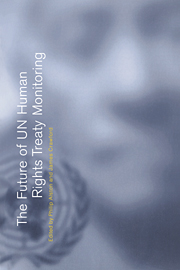Book contents
- Frontmatter
- Contents
- List of Tables, Figure, Appendices
- Notes on Contributors
- Editors' Preface
- Table of Treaties
- Table of Cases
- List of Abbreviations
- 1 The UN human rights treaty system: A system in crisis?
- A The UN human rights monitoring system in action
- 2 Individual claims in a world of massive violations: What role for the Human Rights Committee?
- 3 Decision-taking in the Committee on the Elimination of Racial Discrimination
- 4 The Committee on the Elimination of Discrimination against Women at the crossroads
- 5 The reporting process under the Convention on the Rights of the Child
- 6 The Committee on Economic, Social and Cultural Rights: Catalyst for change in a system needing reform
- 7 Country-oriented procedures under the Convention against Torture: Towards a new dynamism
- 8 UN human rights reporting procedures: An NGO perspective
- B National influences and responses
- C Regional and sectoral comparisons
- D Common challenges for the treaty bodies
- E Looking to the future
- Index
6 - The Committee on Economic, Social and Cultural Rights: Catalyst for change in a system needing reform
Published online by Cambridge University Press: 23 December 2009
- Frontmatter
- Contents
- List of Tables, Figure, Appendices
- Notes on Contributors
- Editors' Preface
- Table of Treaties
- Table of Cases
- List of Abbreviations
- 1 The UN human rights treaty system: A system in crisis?
- A The UN human rights monitoring system in action
- 2 Individual claims in a world of massive violations: What role for the Human Rights Committee?
- 3 Decision-taking in the Committee on the Elimination of Racial Discrimination
- 4 The Committee on the Elimination of Discrimination against Women at the crossroads
- 5 The reporting process under the Convention on the Rights of the Child
- 6 The Committee on Economic, Social and Cultural Rights: Catalyst for change in a system needing reform
- 7 Country-oriented procedures under the Convention against Torture: Towards a new dynamism
- 8 UN human rights reporting procedures: An NGO perspective
- B National influences and responses
- C Regional and sectoral comparisons
- D Common challenges for the treaty bodies
- E Looking to the future
- Index
Summary
Introduction
The state reporting process under the international human rights treaty regime has been subjected to a barrage of criticism in recent years, much of it justified. Some commentators have suggested fundamental reform, some that the entire system should be abolished. While this is too drastic a conclusion at present, there is much room for improvement within existing structures. Indeed throughout the 1990s the treaty bodies have made serious efforts to close some of the more gaping holes in the reporting process. Overall, the system is improving in important ways. This is true of several treaty bodies, but most notably the Committee of the International Covenant on Economic, Social and Cultural Rights (ICESCR). The Committee has developed new mechanisms and given expansive interpretations to the ICESCR and its own rules of procedure with a view to securing greater compliance by states parties. It has done so in a way which encourages, and indeed often results from, the efforts of third parties, in particular non-governmental organisations (NGOs).
Owing to its restricted powers (particularly when contrasted with independent national judicial or quasi-judicial institutions), the Committee can only be expected to have a limited impact upon the actual enjoyment of human rights in countries over which it has occasional supervisory jurisdiction. This is true no matter how far the Committee may improve its methods of work or how intensively it may strive to address serious human rights infractions.
- Type
- Chapter
- Information
- The Future of UN Human Rights Treaty Monitoring , pp. 129 - 144Publisher: Cambridge University PressPrint publication year: 2000
- 10
- Cited by



